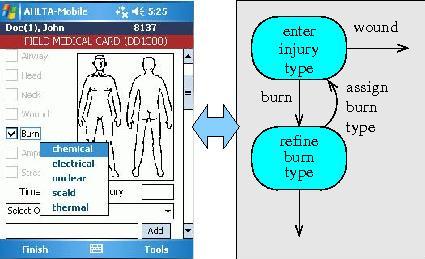| AHLTA-Mobile |
|
One of the major sources of failures in medical device systems is human
error. Nurses, who often lack extensive technical background, misunderstand
the device interface and misinterpret instructions given by the device.
Safety assurance for medical devices is impossible without making them more
robust to human error. An important direction of research in this project
is establishing whether operation of the device is consistent with the mental
model that a typical user of the device has. The technical approach is to
consider mental models represented as finite state machines with transitions
labeled by user interface elements of the device. Once such a model is
constructed, the verification problem is to determine, whether the device
operation is consistent with the model. Research concentrates on two
approaches to determine consistency. One uses model-based testing, where
tests are generated from the model and applied to the device. A more
ambitious direction is to automatically extract an abstraction of the device
operation from the source code of the embedded device software. Then,
consistency can be established using well-known notions of state machine
equivalence and refinement.
A feasibility study concentrates on a handheld point-of-injury data collection device, developed by TATRC, the U.S. Army medical research center. The project team, in collaboration with device developers, is constructing the mental model of the device user and is developing the means of model extraction based on the static analysis of the source code.

|
